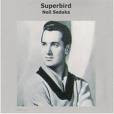Back in the mists of time there was once an invention that promised to revolutionise motoring. It was based on the premise that hands-free music could be enjoyed by employing a cartridge with an endless tape, but it failed abysmally and will be forever remembered in withering terms as the 8-Track Cartridge. A school friend of mine once installed a brand new 8-Track player in his decrepit Morris Traveller (wooden frame version, natch) in the vain hope that it would act as a girl-magnet. It didn’t. Also, what he forgot was that displaying his shiny new equipment was not enough, you needed cartridges to play in it, so one evening he picked up two titles at a garage along with a couple of gallons of 4-star (romance is not dead, eh?).
One was a complete disaster. What he thought was a Jimi Hendrix ‘Best Of’ turned out to be Hendrix hits played by a tribute band called ‘Purple Haze’ or ‘Purple Fox’ or something and pretty dire is was too. The second was a compilation of hits by The Move which whilst infinitely superior didn’t really fall into the ‘girl-magnet’ category either. Truthfully, he should have gone with Cat Stevens or similar but then he wouldn’t have seen the rest of us for dust. And thus it came to pass that The Move was generally played on lads’ journeys to the pub for the next few months.
Interestingly, I own none of the Move’s output and I now wonder whether this period in my life is largely responsible for this state of affairs. However, in a nostalgic frame of mind I tracked down a few videos on the ever-present YouTube and have rediscovered the early works of Roy Wood, and what a body of work it is.
‘I Can Hear the Grass Grow’, ‘Flowers in the Rain’, ‘Fire Brigade’, ‘Blackberry Way’ - Oh God! I can hear us singing them in the back of that Morris Traveller even now. But they are wonderful slices of classic late 1960s throwaway pop which have been largely overshadowed by the appalling excesses of Roy’s next project, Wizzard. Don’t even get me started on Wizzard. I hated them then and I still try not to think about them too much now. I remember a snotty-nosed kid interviewed on TV being asked whether he liked the Beatles. ‘No’ he said. He was subsequently asked who he thought was the greatest ever band and produced the answer, ‘Wizzard’. My case rests m’lud.
So, in order to put all this behind me and make my peace with Roy Wood I am going to look into purchasing some old Move songs, just for old times’ sake. Just don’t expect me to buy an old Morris Traveller and an 8-track player. Or like Wizzard. Nostalgia only extends so far, you know.
One was a complete disaster. What he thought was a Jimi Hendrix ‘Best Of’ turned out to be Hendrix hits played by a tribute band called ‘Purple Haze’ or ‘Purple Fox’ or something and pretty dire is was too. The second was a compilation of hits by The Move which whilst infinitely superior didn’t really fall into the ‘girl-magnet’ category either. Truthfully, he should have gone with Cat Stevens or similar but then he wouldn’t have seen the rest of us for dust. And thus it came to pass that The Move was generally played on lads’ journeys to the pub for the next few months.
Interestingly, I own none of the Move’s output and I now wonder whether this period in my life is largely responsible for this state of affairs. However, in a nostalgic frame of mind I tracked down a few videos on the ever-present YouTube and have rediscovered the early works of Roy Wood, and what a body of work it is.
‘I Can Hear the Grass Grow’, ‘Flowers in the Rain’, ‘Fire Brigade’, ‘Blackberry Way’ - Oh God! I can hear us singing them in the back of that Morris Traveller even now. But they are wonderful slices of classic late 1960s throwaway pop which have been largely overshadowed by the appalling excesses of Roy’s next project, Wizzard. Don’t even get me started on Wizzard. I hated them then and I still try not to think about them too much now. I remember a snotty-nosed kid interviewed on TV being asked whether he liked the Beatles. ‘No’ he said. He was subsequently asked who he thought was the greatest ever band and produced the answer, ‘Wizzard’. My case rests m’lud.
So, in order to put all this behind me and make my peace with Roy Wood I am going to look into purchasing some old Move songs, just for old times’ sake. Just don’t expect me to buy an old Morris Traveller and an 8-track player. Or like Wizzard. Nostalgia only extends so far, you know.






